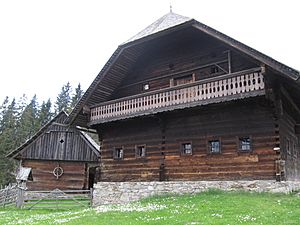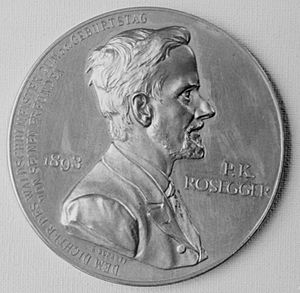Peter Rosegger facts for kids
Peter Rosegger (also spelled Roßegger) was an Austrian writer and poet. He was born on July 31, 1843, and passed away on June 26, 1918. He came from Krieglach in the region of Styria. Peter grew up in the mountains and forests of Alpl, as the son of a mountain farmer. He became a very famous writer and poet. He was also a wise teacher and had many great ideas.
Later in his life, universities in Austria and the city of Graz honored him. He was nominated for the Nobel Prize in Literature three times. He almost won the Nobel Prize in 1913! Even today, many people in Styria see him as a national hero.
Contents
Peter Rosegger's Early Life
Peter Rosegger was the first of seven children. He was born to a farming family in Alpl. This village is high in the mountains above Krieglach, Styria. His family lived in a simple farmhouse from the 1700s. It was called Kluppeneggerhof.
Life was simple. The main room was used for eating, sleeping, and working. Food was cooked over a fireplace in the kitchen area. Today, this farmhouse is part of a museum. You can only reach it by walking.
Alpl was a tiny village with only a few farms. It had no church or school. Peter and the other children had to walk two hours down the mountain. They went to the larger village of St. Kathrein for school or church. Because of this, Peter had very little schooling. A traveling teacher taught him for about a year and a half.
Peter was often sick and not very strong. So, he could not become a farmer like his father. At age seventeen, he became an apprentice to a traveling tailor.
Becoming a Successful Writer
Peter loved books and writing, even though he earned little money. He spent what he could on books. Soon, he started writing his own stories. A publisher from the Graz newspaper, Tagespost, discovered him. His name was Dr. Svoboda. He saw Peter's talent. He helped Peter attend the Academy for Trade and Industries in Graz.
There, Peter von Reininghaus became his helper and friend. Von Reininghaus was a rich and powerful businessman in Graz. Peter and he remained friends for life. However, Peter found studying hard. He was not used to regular school. He also had little knowledge in many subjects. He left the academy in 1869 when he was twenty-six.
Soon after, he got a chance to publish his writings. Gustav Heckenast, a famous publisher, offered him a deal. Peter Rosegger agreed. His first book, Geschichten aus der Steiermark ("Tales from Styria"), came out in 1871. Heckenast published all of Peter's books after that.
After Heckenast passed away, Rosegger worked with two new publishers. He finally chose Ludwig Staackmann, who made him a very good offer. Peter was always loyal to his publishers. They often became good friends. In 1876, Rosegger started his own monthly magazine, Heimgarten. It had articles and stories for people in the countryside.
Peter Rosegger's Life and Personality
In 1873, Peter Rosegger married Anna Pichler. They had two children. But their marriage was short. Anna died in 1875 while giving birth. This made Peter very sad, as seen in his letters to friends. In 1879, Rosegger married again. He married Anna Knaur. They had three more children and a happy family life. She also took care of him when he was sick.
Peter had many smart and unique ideas for his time. He kept in touch with interesting people. Rudolf Falb, who created a popular theory about floods, was his teacher and a lifelong friend. Peter loved his home in the countryside. But he was also a modern thinker with traditional values.
He was interested in machines and technology. He was also a faithful Christian. He saw the good and bad sides of both the church and the new economy of the late 1800s. As a writer, he wanted to entertain, teach, and help people. He often asked for donations publicly. He also used his influence to help start a school in his home village of Alpl. He helped build two churches. One was in Mürzzuschlag, and another in St. Kathrein, which was rebuilt after a fire. He also helped with other good causes.
Honors and Awards
In 1903, on his 60th birthday, Peter Rosegger received a special honor. He was given an "Ehrendoktorwürde" (an honorary doctorate) from the University of Heidelberg. The University of Vienna and the University of Graz also gave him similar awards.
The German emperor Wilhelm II and the Austrian emperor Franz Josef I of Austria gave Rosegger medals of honor. These included the "Kronenorden 2. Klasse" and the "Ehrenabzeichen für Kunst und Wissenschaft". He became an honorary citizen of Graz and Vienna. Franz Josef's successor, Karl, gave the former farmer boy, now a famous national poet, the Franz-Joseph-medal. This was a very high award for a writer.
Later Life and Passing
Peter Rosegger was often ill. In May 1918, he traveled back to his home in Krieglach. He wanted to pass away where his story, "the beautiful legend of the forest-farmer boy," had begun. This was in the forests of the Styrian Alps.
Today, his birth house, the "Forest School" (Waldschule) he helped found in Alpl in 1902, and his house in Krieglach are all museums. He lived in the Krieglach house until his death in 1918. The region where he came from is now unofficially called "Waldheimat" ("Home in the Forest"). This is the name he gave it himself. Tourism in the area still benefits from Rosegger's lasting popularity.
Selected Works by Peter Rosegger
- Zither und Hackbrett (poems in Styrian dialect, 1870)
- Volksleben in Steiermark ("People's Life in Styria"), 1875
- Die Schriften des Waldschulmeisters ("Manuscripts of a Forest-school Master"), 1875
- Waldheimat ("Home in the Forest"), 1877
- Der Gottsucher ("the God-seeker"), 1883
- Heidepeters Gabriel, 1886
- Jakob der Letzte ("Jakob the Last One"), 1888
- Als ich noch jung war ("When I Was Young"), 1895
- Das ewige Licht ("the Eternal Light"), 1896
- Erdsegen ("Earth's Blessing"), 1900
- Als ich noch der Waldbauernbub war ("When I Was a Forest-farmer Boy"), 1902
Film and TV Shows Based on His Work
- I.N.R.I. (directed by Robert Wiene, 1923)
- Das Siegel Gottes (directed by Alfred Stöger, 1949)
- Die Försterbuben (directed by Robert A. Stemmle, 1955)
- Die fröhliche Wallfahrt (directed by Ferdinand Dörfler, 1956)
- Als ich noch der Waldbauernbub war... (1963, TV film)
- Aus meiner Waldheimat (1963, TV film)
- Als ich beim Käthele im Wald war (1963, TV film)
- Am Tage des Gerichts (1965, TV film)
- Jakob der Letzte (directed by Axel Corti, 1976, TV film)
- Waldheimat (1983–1984, TV series, 26 episodes)
- Die Försterbuben (directed by Peter Patzak, 1984, TV film)
- Erdsegen (directed by Karin Brandauer, 1986, TV film)
See also
 In Spanish: Peter Rosegger para niños
In Spanish: Peter Rosegger para niños
 | DeHart Hubbard |
 | Wilma Rudolph |
 | Jesse Owens |
 | Jackie Joyner-Kersee |
 | Major Taylor |



